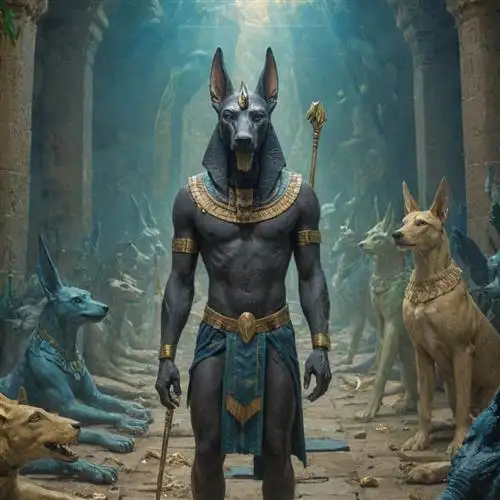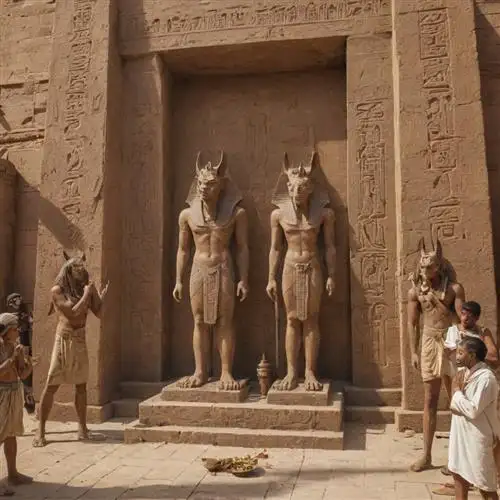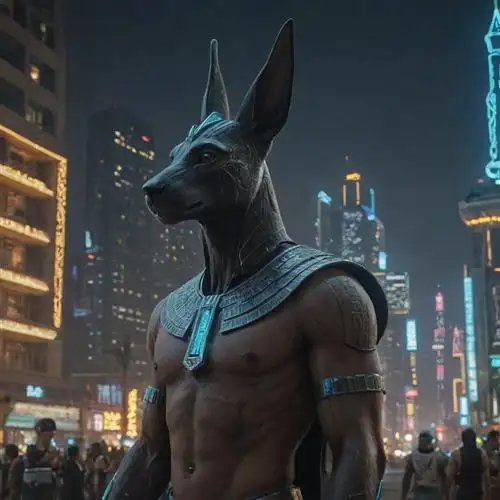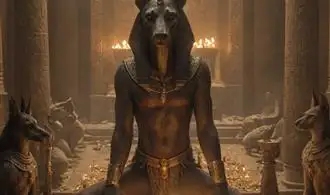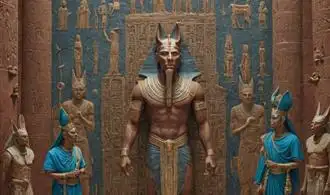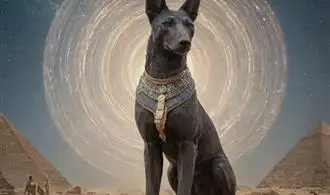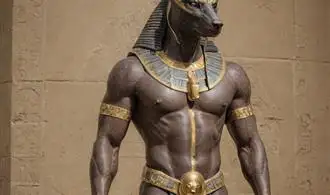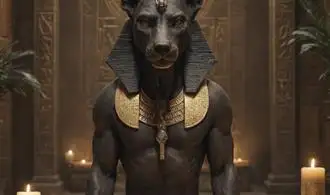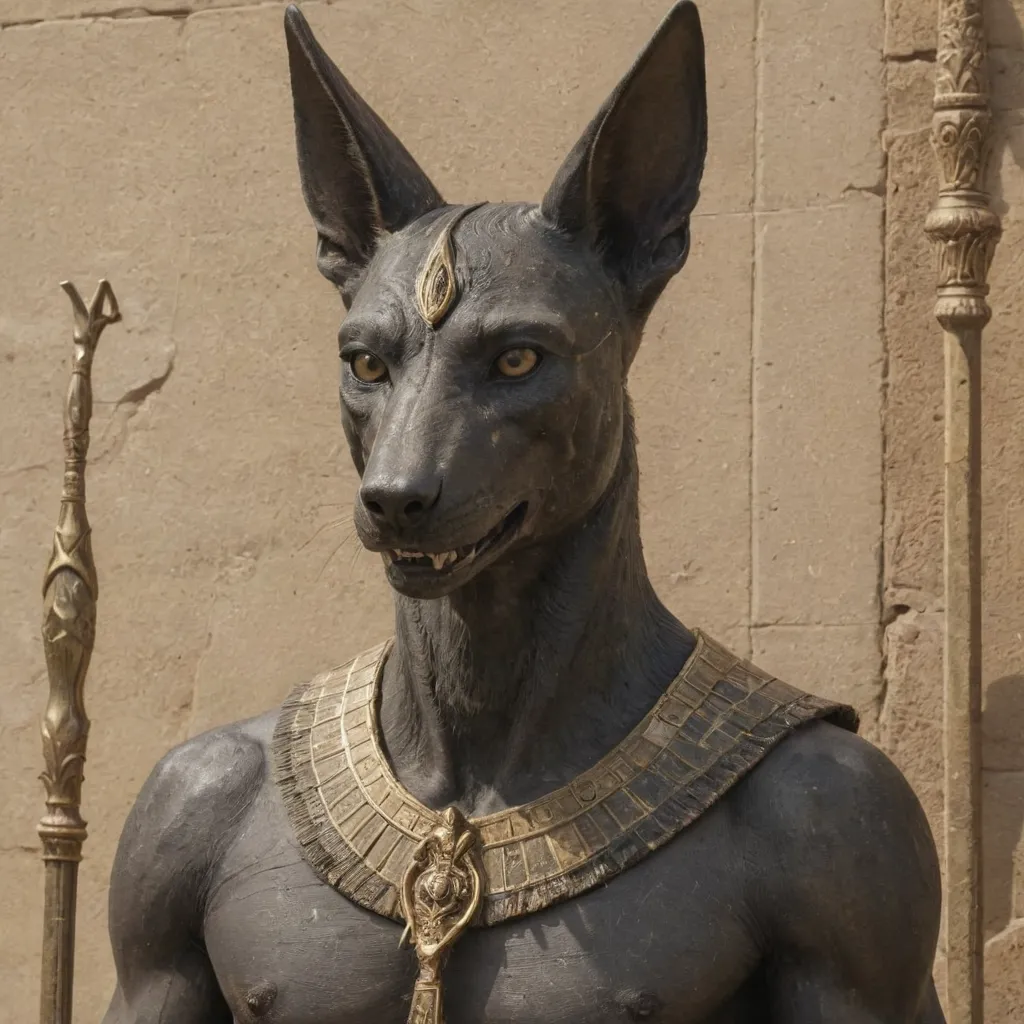
The Enigmatic Anubis
Anubis, the enigmatic jackal-headed god, has long been a central figure in ancient Egyptian mythology. This enigmatic deity, associated with mummification, the afterlife, and the protection of the dead, has captivated the imaginations of scholars and enthusiasts alike. Delving into the enigmatic nature of Anubis, we uncover a multifaceted deity whose significance transcends the boundaries of time and culture.
At the heart of Anubis's enigmatic nature lies his dual role as a protector and a guide. As the god of mummification, Anubis was believed to oversee the process of preserving the dead, ensuring a successful transition to the afterlife. This association with the afterlife imbued Anubis with a sense of mystery and reverence, as he was seen as a gatekeeper to the realm of the dead.
Interestingly, Anubis's iconography also reveals a deeper symbolic significance. The jackal-headed deity is believed to represent the balance between life and death, light and darkness. This duality reflects the cyclical nature of existence, where Anubis serves as a mediator between the physical and the spiritual realms. Insider Information - The Secrets of Anubis Revealed delves deeper into the esoteric and symbolic meanings associated with this enigmatic figure.
Another facet of Anubis's enigmatic nature is his connection to the concept of judgment and the weighing of the soul. In the Egyptian Book of the Dead, Anubis is depicted as the one who oversees the weighing of the heart, determining the worthiness of the deceased to enter the afterlife. This role as a judge of the dead further imbues Anubis with a sense of power and authority, adding to the aura of mystery that surrounds him.
Interestingly, Anubis's prominence and significance have endured throughout the ages, with his cult continuing to thrive in modern times. Devotees of ancient Egyptian spirituality and practitioners of modern Pagan and occult traditions often incorporate Anubis into their spiritual practices, seeking his guidance and protection in their journey towards enlightenment.
The Importance of Anubis in Ancient Egyptian Beliefs
Anubis, the jackal-headed deity, held a paramount position in the pantheon of ancient Egyptian deities. As the god of the dead, embalming, and the underworld, Anubis played a crucial role in the elaborate funerary rituals and beliefs of the ancient Egyptians. His importance in this realm cannot be overstated, as he was responsible for guiding the deceased through the treacherous journey of the afterlife.
One of Anubis' primary functions was the mummification process. As the patron of this sacred ritual, he was believed to oversee the embalming of the dead, ensuring the preservation of the physical body. This was of paramount importance, as the ancient Egyptians believed that the soul could only reunite with the body in the afterlife. Anubis' association with this process elevated him to a position of reverence and made him an indispensable figure in the Egyptian conception of the afterlife.
Additionally, Anubis was responsible for the weighing of the heart ceremony, a critical moment in the journey of the deceased. During this ritual, the heart of the deceased was weighed against the feather of truth, representing the individual's moral and ethical standing. Anubis, as the overseer of this process, determined the fate of the soul, ensuring that only those deemed worthy could proceed to the next stage of the afterlife.
Beyond his role in the mummification and judgment of the dead, Anubis was also believed to be a protector of the deceased. He was often depicted as standing guard over the tomb, ensuring the safety and well-being of the departed soul. This protective aspect of Anubis' character further solidified his importance in the ancient Egyptian belief system, as the Egyptians placed great emphasis on the care and veneration of their deceased.
Rituals and Offerings to Anubis
Anubis, the jackal-headed god of the ancient Egyptian pantheon, has long been revered for his role as the guardian of the dead and the protector of the afterlife. As a deity intrinsically linked to the transition from life to death, Anubis' worship has endured through the centuries, with many practitioners seeking to honor him through a variety of rituals and offerings. For those interested in establishing a connection with this powerful deity, understanding the appropriate protocols and practices is crucial.
One of the primary ways to honor Anubis is through the performance of funerary rituals. These ceremonies, often conducted during the embalming process or at the time of burial, involve the invocation of Anubis to guide the deceased safely through the underworld and ensure their successful transition to the afterlife. Practitioners may choose to incorporate items such as amulets, candles, or incense into these rituals, each with its own symbolic significance.
In addition to funerary rites, Anubis is also revered through various offerings and devotional practices. Many worshippers choose to leave offerings of food, wine, or flowers at altars or shrines dedicated to the deity, as a means of showing respect and gratitude. These offerings can be made on a regular basis, or in conjunction with specific festivals or ceremonies honoring Anubis.
Another important aspect of Anubis worship involves the use of divination and ritual magic. Practitioners may seek to communicate with Anubis through methods such as tarot, scrying, or dream work, in an effort to gain insights into the afterlife or to receive guidance on complex personal or spiritual matters. These rituals often require careful preparation and a deep understanding of the symbolism and mythology associated with Anubis.
Anubis in Modern Spiritual Practices
Anubis, the canine-headed Egyptian deity, has long been revered for his association with the afterlife and his role as the guide of souls. In modern spiritual practices, Anubis continues to hold a significant place, inspiring devotees worldwide to seek his guidance and wisdom. This article delves into the various ways in which Anubis is integrated into contemporary spiritual traditions and the reasons why worshiping this deity can be a profoundly transformative experience in 2023.
One of the primary reasons Anubis remains a prominent figure in modern spiritual practices is his deep connection to the process of death and rebirth. As the god of embalming and the protector of the dead, Anubis is seen as a powerful ally in navigating the transitions and transformations that are an inherent part of the human experience. Many practitioners turn to Anubis for assistance in letting go of the old, embracing the new, and finding the courage to face the unknown. His presence can provide a sense of stability and reassurance during times of upheaval and uncertainty.
Another aspect of Anubis' relevance in contemporary spirituality is his association with discernment and clear-sightedness. As the deity who weighs the hearts of the deceased, Anubis is believed to possess the ability to see through illusions and reveal the truth. This quality makes him a valuable ally for those seeking to cultivate greater self-awareness, deepen their intuition, and make informed decisions that align with their highest good. By invoking Anubis, practitioners can tap into his perceptive abilities and gain a clearer understanding of their own inner landscape and the world around them.
Furthermore, Anubis is often invoked in spiritual practices that focus on the journey of the soul and the exploration of the afterlife. Many modern-day Pagans, Wiccans, and followers of alternative spiritual paths incorporate Anubis into their rituals and meditations, seeking his guidance and protection as they navigate the unseen realms. Anubis Deity Rituals That Will Change Your Life outlines some of the powerful ways in which Anubis can be engaged with in these transformative practices.
The Symbolism and Attributes of Anubis
Anubis, the jackal-headed deity of ancient Egyptian mythology, is a figure of immense significance and enduring fascination. As the god of the dead, embalming, and the afterlife, Anubis holds a crucial role in the complex cosmology of ancient Egyptian religion. Understanding the symbolism and attributes of Anubis can provide valuable insights into the beliefs and practices of this ancient civilization, and offers a compelling reason to consider worshipping this enigmatic deity in 2023.
At the core of Anubis' symbolism is his association with the process of mummification and the afterlife. As the god who presided over the embalming process, Anubis was responsible for guiding the deceased through the perilous journey to the afterlife, ensuring the preservation of the physical body. This role made Anubis a crucial figure in the Egyptian conception of the afterlife, as the successful transition of the deceased into the next world was dependent on his divine intervention.
Anubis' jackal-headed appearance is symbolic of his dual nature as both a protector and a harbinger of death. The jackal, a scavenger animal that was often found prowling around ancient Egyptian cemeteries, was seen as a powerful and ominous creature, capable of both guarding the dead and desecrating their remains. By taking on the form of a jackal, Anubis embodied this duality, representing both the reverence and the fear associated with the afterlife.
In addition to his role as the overseer of mummification and the afterlife, Anubis was also associated with several other important attributes and responsibilities. He was believed to be the patron of lost souls, guiding and protecting those who had become separated from their loved ones or their community. Anubis was also seen as a deity of justice, responsible for weighing the heart of the deceased against the feather of truth during the final judgment in the afterlife.


